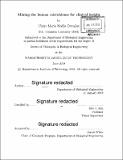| dc.contributor.advisor | Eric J. Alm. | en_US |
| dc.contributor.author | Duvallet, Claire Marie Noëlle. | en_US |
| dc.contributor.other | Massachusetts Institute of Technology. Department of Biological Engineering. | en_US |
| dc.date.accessioned | 2019-11-22T00:09:03Z | |
| dc.date.available | 2019-11-22T00:09:03Z | |
| dc.date.copyright | 2019 | en_US |
| dc.date.issued | 2019 | en_US |
| dc.identifier.uri | https://hdl.handle.net/1721.1/123061 | |
| dc.description | Thesis: Ph. D., Massachusetts Institute of Technology, Department of Biological Engineering, 2019 | en_US |
| dc.description | Cataloged from PDF version of thesis. | en_US |
| dc.description | Includes bibliographical references. | en_US |
| dc.description.abstract | The human microbiome is essential for health and has been implicated in many diseases. DNA sequencing has enabled the detailed characterization of these human-associated microbial communities, leading to a rapid expansion in studies investigating the human microbiome. In this thesis, I describe multiple projects which overcome various data analysis challenges to extract useful clinical insights from microbiome data. In the first project, I present an analysis of lung, stomach, and oropharyngeal microbiomes. I leverage data collected from multiple sites per patient to identify aspiration-associated changes in the relationships between these communities, discovering new properties of the aerodigestive microbiome and suggesting new approaches for treatment. In the second project, I perform a meta-analysis of case-control gut microbiome datasets with standard data processing and analysis methods. | en_US |
| dc.description.abstract | I find consistent patterns characterizing disease-associated microbiome changes and a set of shared associations which could inform clinical treatment and therapeutic development approaches for different microbiome-mediated diseases. Enabled by this work, in the third project I contribute to the development of a method to correct for batch effects in case-control microbiome studies. In the fourth project, I describe a framework for rational donor selection in fecal microbiota transplant clinical trials in which knowledge derived from clinical and basic science research is used to inform which donor is selected for fecal transplants, increasing the likelihood of successful trials. Finally, I present preliminary results analyzing the microbiome and metabolome of residential sewage as a novel platform for community-level public health surveillance. | en_US |
| dc.description.abstract | Together, these projects demonstrate a variety of approaches to mine the human microbiome for clinically-relevant insights and suggests multiple avenues forward for translating findings from microbiome data analyses into clinical and public health impact. | en_US |
| dc.description.statementofresponsibility | by Claire Marie Noëlle Duvallet. | en_US |
| dc.format.extent | 234 pages | en_US |
| dc.language.iso | eng | en_US |
| dc.publisher | Massachusetts Institute of Technology | en_US |
| dc.rights | MIT theses are protected by copyright. They may be viewed, downloaded, or printed from this source but further reproduction or distribution in any format is prohibited without written permission. | en_US |
| dc.rights.uri | http://dspace.mit.edu/handle/1721.1/7582 | en_US |
| dc.subject | Biological Engineering. | en_US |
| dc.title | Mining the human microbiome for clinical insight | en_US |
| dc.type | Thesis | en_US |
| dc.description.degree | Ph. D. | en_US |
| dc.contributor.department | Massachusetts Institute of Technology. Department of Biological Engineering | en_US |
| dc.identifier.oclc | 1127291058 | en_US |
| dc.description.collection | Ph.D. Massachusetts Institute of Technology, Department of Biological Engineering | en_US |
| dspace.imported | 2019-11-22T00:09:02Z | en_US |
| mit.thesis.degree | Doctoral | en_US |
| mit.thesis.department | BioEng | en_US |
